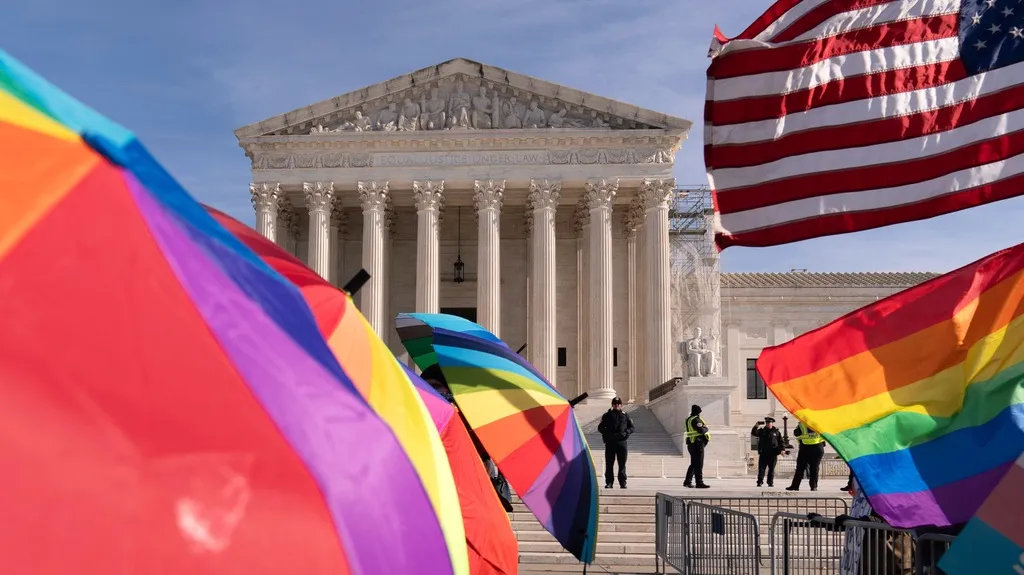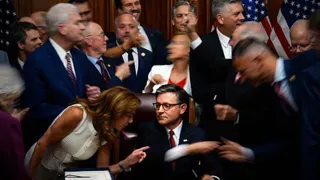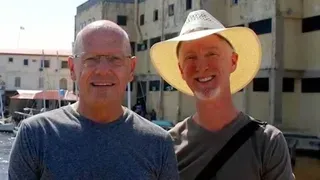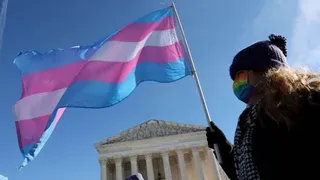March 15, 2008
With progressive challenger, Kerry's opposition to marriage equality softens
Michael Wood READ TIME: 8 MIN.
In the midst of a re-election challenge from the left in the Democratic Primary this September, Sen. John Kerry has softened his longstanding opposition to same-sex marriage. In a statement to Bay Windows Kerry said that civil marriage rights for same-sex couples are established law in Massachusetts and should remain so. He has also touted his work to sway state legislators to vote against the anti-gay marriage constitutional amendment at last June's constitutional convention, as proof of his support.
The March 11 statement to Bay Windows from Kerry spokeswoman Brigid O'Rourke stated in part, "In Massachusetts, just last spring Senator Kerry worked with Gov. Patrick and progressive legislators to help defeat a draconian and discriminatory constitutional amendment that would have banned same sex marriage in Massachusetts. Sen. Kerry believes that in Massachusetts, gay marriage is a matter of settled law and there is no reason to change the law."
The statement also notes that Kerry has always believed that same-sex couples "should be afforded the same legal protections and benefits that married couples enjoy," - a reference to his longstanding support for domestic partnerships and civil unions - and that he has consistently opposed federal efforts to ban legal protections for same-sex couples, including voting against the Defense of Marriage Act (DOMA) in 1996. Additionally, the statement pointed out that in his 2004 speech accepting the Democratic presidential nomination, Kerry spoke out against the Federal Marriage Amendment, which was supported by his Republican opponent, President George W. Bush.
At the Fleet Center in Boston, Kerry alluded to Bush's support for the amendment by saying, "Let's honor this nation's diversity. Let's respect one another. And let's never misuse for political purposes the most precious document in American History, the Constitution of the United States."
The Kerry statement was issued in response to inquiry from Bay Windows on whether Kerry was still opposed to civil marriage rights for same-sex couples. During his 2004 presidential campaign, Kerry publicly supported an amendment to the state constitution that would have banned same-sex couples from marrying. His support for the amendment angered many local activists and LGBT campaign contributors, several of whom demanded their money back. In 2005, Kerry again angered local activists when he spoke out against the state Democratic Party's plan to add a plank supporting marriage equality into the party platform. "I think it's the wrong thing, and I'm not sure it reflects the broad view of the Democratic Party," Kerry told the Boston Globe at the time.
He also told the paper, "I'm opposed to gay marriage. ... I support [domestic] partnerships and civil unions." Kerry's stance put him at odds with fellow Bay State Sen. Ted Kennedy, who spoke at the 2005 convention, and then- state Democratic Party Chair Phil Johnston.
During an interview with Bay Windows O'Rourke characterized Kerry's current stance as "an evolution" of his views on civil marriage rights. "It's not uncommon for people's viewpoints to change as they experience life," said O'Rourke.
Kerry's shift comes as he is facing a primary challenge from former Gloucester city councilor and attorney Ed O'Reilly. O'Reilly is a marriage equality supporter who has tried to use Kerry's past position on the issue to distinguish himself from Kerry. On his campaign website O'Reilly lists their differing viewpoints on marriage equality under the heading, "Where We Stand: Points Of Difference," along with their varying opinions on issues like immediate troop withdrawal from Iraq and impeaching President George W. Bush and Vice President Cheney, both of which O'Reilly supports. O'Reilly has also called for the repeal of section three of DOMA, which defines marriage as between a man and a woman for federal purposes. Its repeal would allow married same-sex couples in Massachusetts to file federal taxes jointly and pass on Social Security benefits to one another. On his endorsement questionnaire for the Progressive Democrats of America - whose support he won in January - O'Reilly listed the partial repeal of DOMA as one of the top three issues on which he'd take a leadership role if elected, along with establishing single-payer healthcare and the withdrawal of U.S. troops from Iraq.
Additionally, O'Reilly has courted support in the LGBT community on the campaign trail. He turned up at a prayer service sponsored by the Religious Coalition for the Freedom to Marry on the morning of the June 14 constitutional convention and attended MassEquality's victory party in December. He also supports other LGBT-related federal legislation such as the Employment Non-Discrimination Act and the repeal of "Don't Ask, Don't Tell." He lists his support of David James, an openly gay man and the co-founder of Western Mass. Pride at Work, an LGBT constituent group of the AFL-CIO as further evidence of his strong support for the LGBT community.
The O'Reilly campaign welcomed the news of Kerry's new support for civil marriage rights and praised his efforts to defeat last year's anti-gay marriage amendment. "We're glad that Senator Kerry has changed his position on marriage equality," said O'Reilly in a statement issued by his spokesman, Peter Vickery. "We're glad that he stopped advocating the anti-equality amendment and started opposing it. Many people from across Massachusetts called their state legislators, and it's nice that John Kerry was one of those people. But a U.S. Senator's most effective zone of influence is the U.S. Senate and it is in the U.S. Senate that Ed O'Reilly would fight for the repeal of DOMA."
Marriage equality advocates were mixed in their responses to Kerry's recent statement. "I think it clearly demonstrates, and not surprisingly, that Sen. Kerry strongly believes in marriage equality in the state of Massachusetts," said Mary Breslauer, a member of the Human Rights Campaign's Boston Steering Committee who headed up Kerry's LGBT steering committee during his presidential run. While his support has changed over time, said Breslauer, "he never shifted from the very principled belief that gay and lesbian couples should be afforded the same rights and benefits as married couples."
MassEquality Campaign Director Marc Solomon was less impressed, saying that Kerry was "parsing words" in his statement by not explicitly stating that he supported civil marriage rights. "It's time for John Kerry to state that he supports marriage equality, that he thinks it's a good thing," said Solomon.
Solomon also said that Kerry's support of the Travaglini-Lees amendment during the 2004 constitutional convention was "damaging" during the critical early legislative marriage debates.
"It hurt us very significantly in the first votes to have John Kerry, the Democratic nominee, supporting the constitutional amendment. I've got to be honest about that," said Solomon. While he said that he understood that Kerry could not support civil marriage rights for same-sex couples during the 2004 campaign, he did not understand why Kerry continued to oppose such rights in 2005. Solomon that he contributed to the Kerry said campaign at a large LGBT fundraiser that netted the candidate "hundreds of thousands of dollars."
"After all the work that the Massachusetts LGBT community did for him in 2004," said Solomon, "it was especially distressing to hear him continue to oppose marriage equality even when he was no longer a presidential candidate."
Gary Daffin, co-chair of the Massachusetts Gay and Lesbian Political (MGLPC), noted that a politician's evolutionary process is often dictated by the election calendar. "Some people may not evolve as quickly as we want and their evolution may appear to be conveniently slow at times or conveniently quick at times," he laughed.
Does Kerry fall into the fast or the slow camp? "I think many people fall into both," said Daffin. "It's conveniently slow when you're in the middle of a presidential campaign and you don't want the issue to be front and center, that makes a lot of sense." Daffin said he's not surprised that now that Kerry's facing a challenge from an outspoken marriage equality proponent, he's come to the conclusion that as a matter of public policy in Massachusetts, the issue is settled.
Kerry is the last statewide elected office holder to come out in favor of civil marriage rights for same-sex couples. Among the earliest were Sen. Ted Kennedy and State Auditor Joe DeNucci, the latter whom appeared at a March 2004 press conference with former pro wrestler and Minnesota governor Jesse Ventura to urge the legislature not to overturn the Goodridge decision. Since then, Secretary of State William Galvin, State Treasurer Tim Cahill, Attorney General Martha Coakley and Gov. Deval Patrick and Lt. Gov. Tim Murray have all already gone on record as marriage equality supporters.
And though Kerry is now touting his behind-the-scenes efforts to swing legislators against the amendment last year, according to a source with knowledge of the state congressional delegation's work to defeat the amendment, Kerry didn't do as much as his Senate colleague. "Kerry played a role but it was very much a secondary role."
State Rep. Brian Wallace, whose vote against the amendment surprised many, said that Kerry called him just before he headed to the House floor for the roll call vote. "He said, I know where you're coming from, I know this a very tough vote for you, he said, but you need to make it, it's an important vote," Wallace recalled, adding that Kerry also said, "If we lose this a lot of things change."
Wallace said that Kerry did not articulate a personal position on civil marriage rights, nor did Wallace ask him about it. "By that time I had taken calls from so many people," Wallace explained. "I had the Cardinal [Sean O'Malley] on the other line. ... I wasn't really concerned with what his stance was, to be honest. I was more concerned about what was ahead of me." Nonetheless, Wallace said, Kerry's appeal for him to vote down the amendment, "meant something," to him. "I thought it was important for him to lay that out with me."
Regardless of Kerry's past missteps on marriage, it's more than likely that his shift on the issue will blunt O'Reilly's attempts to peel away significant LGBT support from Kerry. The LGBT community has yet to hold a slow evolutionary process on marriage against any other elected official, no matter how late-breaking, with the exception of former Attorney General Tom Reilly. But unlike Reilly, apart from his past opposition on marriage, Kerry's record in Congress and in the Senate on LGBT issues is unassailable. Just this week, for instance, he succeeded in inserting a bill he is cosponsoring to repeal the ban on HIV-positive travelers into the United States into the President's Emergency Plan for AIDS Relief (PEPFAR).
Regardless of what LGBT voters think of Kerry, O'Reilly's will have a tough time unseating Kerry according to Suffolk University pollster David Paleologos. "At this point I don't see Kerry vulnerable in the primary," said Paleologos. "The initial polling indicates he could have a problem in the final if he had the right opponent. I don't think his current final election opponent [Republican Jim Ogonowski] is the right opponent and I think it's the wrong time," said Paleologos, noting that turnout will be heavier in November because of the presidential election, which gives the incumbent the advantage, especially in a heavily Democratic state like Massachusetts.
And as Kerry well knows, timing is everything.
Michael Wood is a contributor and Editorial Assistant for EDGE Publications.







